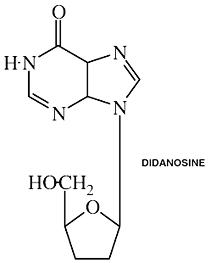

Didanosine
Brand Names: VidexPlease read the disclaimer concerning the intent
and limitations of the information provided here.
The information presented in Interactions is for
informational and educational purposes only. It is based on scientific
studies (human, animal, or in vitro), clinical experience, case
reports, and/or traditional usage with sources as cited in each
topic. The results reported may not necessarily occur in all
individuals and different individuals with the same medical conditions
with the same symptoms will often require differing treatments. For
many of the conditions discussed, treatment with conventional medical
therapies, including prescription drugs or over-the-counter
medications, is also available. Consult your physician, an
appropriately trained healthcare practitioner, and/or pharmacist for
any health concern or medical problem before using any herbal products
or nutritional supplements or before making any changes in prescribed
medications and/or before attempting to independently treat a medical
condition using supplements, herbs, remedies, or other forms of
self-care.
![]()
Do not rely solely on the information in this article.
References
Famularo G, Moretti S, Marcellini S, Trinchieri V, Tzantzoglou S, Santini G, Longo A, De Simone C. Acetyl-carnitine deficiency in AIDS patients with neurotoxicity on treatment with antiretroviral nucleoside analogues.
AIDS 1997 Feb;11(2):185-190.
Abstract: OBJECTIVE: A severe dose limiting axonal peripheral neuropathy may develop in subjects on treatment with the nucleoside analogues didanosine (ddl), zalcitabine (ddC), and stavudine (d4T). The impairment of mitrochondrial DNA synthesis is crucial to the pathogenesis of this disorder although other mechanisms have not been ruled out. The depletion of acetyl-carnitine, which regulates the metabolism and function of peripheral nerves could contribute to the neurotoxicity of these compounds. DESIGN: Non-randomized, cross-sectional study of selected patients. METHODS: We measured the serum levels of acetyl- and total carnitine in 12 subjects with axonal peripheral neuropathy developed on treatment with different regimens of neurotoxic nucleoside analogues (ddl, ddC, d4T). Subjects who did not develop peripheral neuropathy while staying on treatment with ddl (n = 10) or zidovudine (n = 11) served as the control groups. HIV-negative subjects with axonal on demyelinating autoimmune neuropathies (n = 10) and healthy individuals (n = 13) were additional control groups. RESULTS: Subjects experiencing axonal peripheral neuropathy on treatment with ddl, ddC and d4T had significantly reduced levels of acetyl-carnitine in comparison to the control groups. No difference was observed in the levels of total carnitine between study subjects and the control groups. CONCLUSIONS: Our results demonstrate that subjects who developed peripheral neuropathy while staying on treatment with ddl, ddC and d4T had acetyl-carnitine deficiency. The normal levels of total carnitine in the study group appear to indicate the specificity of the defect and rule out coexisting relevant nutritional problems. The critical role of acetyl-carnitine for the metabolism and function of the peripheral nerves supports the view that the acetyl-carnitine deficiency found in these subjects may contribute to the neurotoxicity of ddl, ddC and d4T, even though the interference with mitochondrial DNA synthesis is regarded as the main cause of their toxicity.
Gordon M, Guralnik M, Kaneko Y, Mimura T, Goodgame J, DeMarzo C, Pierce D, Baker M, Lang W. A phase II controlled study of a combination of the immune modulator, lentinan, with didanosine (ddI) in HIV patients with CD4 cells of 200-500/mm3. J Med 1995;26(5-6):193-207.
Abstract: This study was carried out to assess the safety and efficacy of a combination of lentinan, an immune modulator, and didanosine (ddI) in a controlled study in HIV positive patients with CD4 levels of 200-500 cells/mm3. Didanosine was administered to HIV patients at doses of 400 mg/day (po) for six weeks (bid), then 2 mg of lentinan i.v. was added per week for 24-80 weeks. A control group (20%) received ddI only. A total of 107 patients were enrolled at three sites, and 88 patients started the ddI/lentinan phase. The combination caused significant increases in CD4 levels up to 38 weeks, whereas ddI alone was significant at the 5% level at 14 weeks. Based on these data, lentinan qualifies as a participant in future multi-drug studies in HIV.
Threlkeld DS, ed. Anti-Infectives, Antiviral Agents, Didanosine. In: Facts and Comparisons Drug Information. St. Louis, MO: Facts and Comparisons, Mar 1993, 406k-406t.
Threlkeld DS, ed. News, Keeping Up, December 1994, Lentinan. In: Facts and Comparisons Drug Information. St. Louis, MO: Facts and Comparisons, Dec 1997, 805.